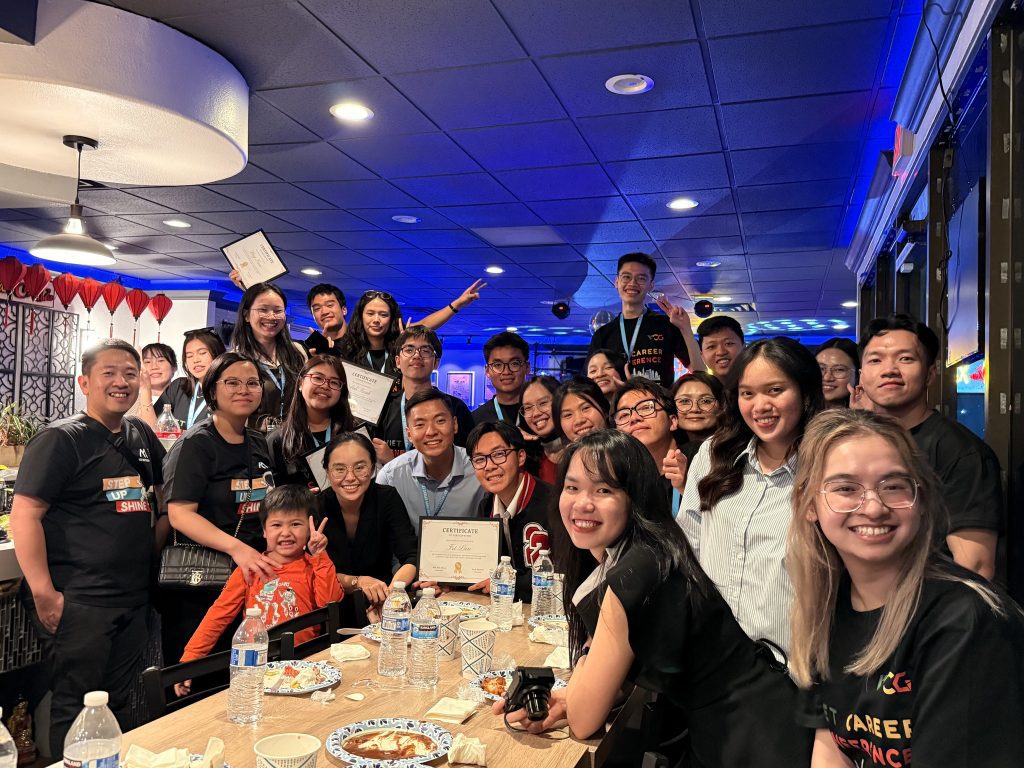Q&A with Mentor Tony Nguyễn (Area Specialist at Microsoft, MBA Candidate at Cornell University ’25) and Mentor Ánh Vũ (Business Manager at Lendinglub, Carnegie Mellon Graduate ’24).
Q: In your opinion, what makes an MBA application stand out for top schools?
A – Mentor Ánh Vũ: There’s one common thread: you truly need to be good. However, in an environment where everyone is exceptional, your personal elements and the way you tell your story are what make you stand out.
Tú studied Physics in high school but later chose to major in Business at the undergraduate level (in Vietnam). From there, she discovered the connection between the logic of Physics and strategic thinking in Business. When these unique links and challenges were brought into her essays, her story became both distinctive and authentic.

Top schools aren’t just looking for people who are talented and humble, but also for those who can create positive impact and genuinely drive social value. For example, a mentee once said he wanted to build a startup helping SMEs in Vietnam with a specific issue—but in reality, SMEs in Vietnam don’t operate in that space. The solution has to be practical for the story to work.
A – Mentor Thành (Tony) Nguyễn: I agree with Ánh. I usually evaluate two main components.
First are the elements tied to your existing background and experience—such as the companies you’ve worked for, your roles, and your years of experience. These are things you can’t change overnight.
Second, and where you should focus most, are the elements you can improve, such as:
How you build your application package
Your interview performance
GMAT/GRE scores, etc.
Many people say the GMAT isn’t important—but context matters. If your profile is already strong (for example, consulting at an MBB firm), then your GMAT is only a supporting factor.
But if you come from a smaller, less-known company, a high GMAT score helps you “get in the door” for an interview. And once you get an interview, performance becomes critical.
Top schools also care a lot about whether you have a clear sense of direction. In your essays, that shows through your short-term and long-term goals and how you will contribute to the program.
To make your essay truly stand out, your short-term goals must link closely to your past experience and be highly personal. Your long-term goals should then logically build on that foundation.
Finally, in interviews, you need to show that you truly understand the school, have done your homework, and demonstrate genuine enthusiasm and commitment. When working with students who get into top schools, I realize how crucial it is to dig deep into their personal stories. For example, when working with Khả Tú last year, we went all the way back to her high-school journey to understand why she chose her path.

Q: What if my experience is mainly tied to my current industry and firm, and I don’t have many activities or projects with social impact?
A – Mentor Thành (Tony) Nguyễn: That’s completely fine. As I always say, an application includes parts you can change and parts you can’t.
What you already have and do well—double down on it.
What you can improve—focus on improving it.
What belongs to the past—don’t force yourself to patch it unnaturally.
Social impact is only one part of the overall picture, not a mandatory requirement for a strong application. Many candidates with solid careers and proven effectiveness in their field are still highly valued. They stand out in their own way.
A – Mentor Ánh Vũ: Put yourself in the adcom’s shoes and think about what they need. If you say you want to succeed in your field and can articulate the broader big picture of how you plan to contribute or create value, that reflects managerial thinking. And that’s exactly what MBA programs look for: people who think ahead, take action, and aren’t afraid to ask “why not?”
Social impact doesn’t have to mean specific community or volunteer activities. It can be how you plan to contribute to your industry or how you aim to create greater long-term value.
A – Mentor Thành (Tony) Nguyễn: One more point: contribution doesn’t only come from your work or career goals. It can come from your personal interests and passions—the things that make you likable and relatable.
MBA programs in the U.S. especially appreciate candidates who combine capability with authentic stories, warmth, sincerity, and strong interpersonal connection.





